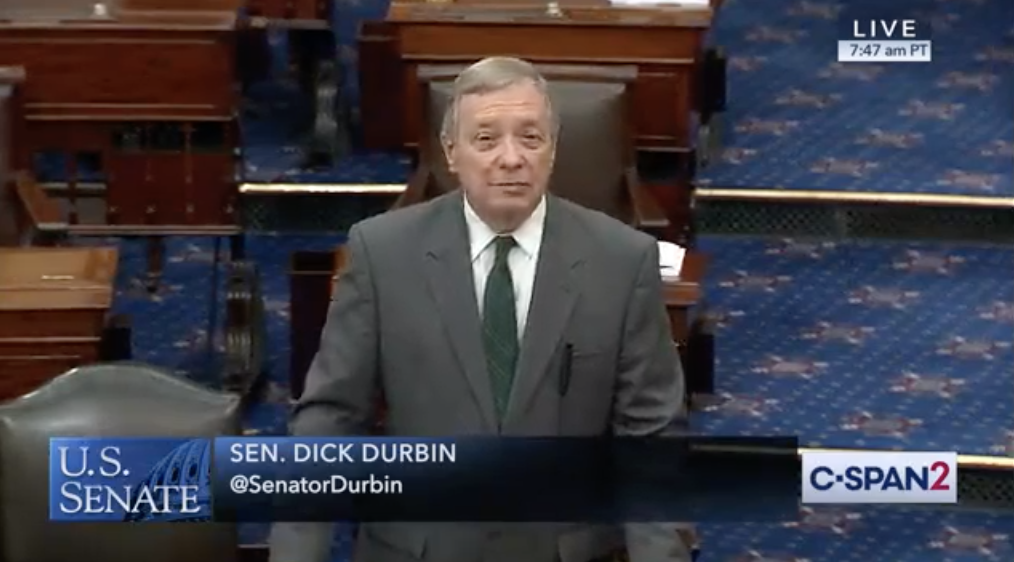UCA among Organizations Endorsing Senator Durbin’s Bill S.2603 on Green Card Reforming
UCA president Haipei Shue visited Senator Durbin and Senator Duckworth’s offices and discussed issues of immigration, S.386 and Chinese American scientists. At the request of Senator Durbin’s office, UCA has endorsed his new legislation “Resolving Extended Limbo for Immigrant Employees and Families (RELIEF) Act” (S.2603), along with a list of other organizations.
Sen. Durbin tweeted that “One of the most serious problems in our broken immigration system is the lack of green cards, leaving immigrants in a crippling backlog. The solution is clear: increase the number of green cards. Proud to introduce the RELIEF Act with @SenatorLeahy to eliminate the backlog.”

During his introduction speech, Durbin criticized the Senate leadership for ignoring the immigration issue, pointing out that, last year, there was only one hearing in the Senate and no vote on the floor.
Reminding his colleagues that they are there to solve the problems the country is facing, he said: “Here is a problem we are not solving: How to deal with the backlog of people highly skilled and important people, like [a] doctor from my hometown of Springfield from India, who wants to have a Green Card, giving him an opportunity to become an American citizen. You know what? I want that doctor to become an American citizen. I want him to get a Green Card. We need him in my hometown, many more like him. I want his family with him.”
However, S.2603 was blocked by Sen. John Kennedy (R-LA) from seeking an Unanimous Consent (UC). The content of the bill can be found at the official press release. Here’s a short summary provided by the office.
Appendix: Resolving Extended Limbo for Immigrant Employees and Families (RELIEF) Act
One of the most serious problems in our broken immigration system is that there are not nearly enough immigrant visas – also known as green cards – available each year. As a result, immigrants are stuck in crippling backlogs for many years.
Close to four million future Americans are on the State Department’s immigrant visa waiting list, which doesn’t include hundreds of thousands of immigrants in the U.S. who are also waiting for green cards. However, under current law only 226,000 family green cards and 140,000 employment green cards are available annually. Children and spouses of lawful permanent residents (LPRs) count against these caps, further restricting the number of available green cards.
The backlogs are a particular hardship on families who are caught in immigration limbo. For example, children of LPRs often “age out” because they are no longer “children,” as defined under immigration law, by the time green cards are available for them.
The solution to the green-card backlog is clear: increase the number of green cards. Immigration law also should treat children and spouses of LPRs as immediate relatives, just as they are considered when their family members become citizens. The Senate did exactly this in S. 744, the comprehensive immigration reform bill which passed the Senate in 2013 on a strong bipartisan vote.
Congress should also lift green-card country caps, which were designed to preserve immigration diversity but have contributed to backlogs because of the insufficient number of green cards and the large number of immigrants in the United States stuck on temporary work visas. However, lifting country caps alone without increasing the number of green cards will not eliminate backlogs for Indian immigrants (the nationality with the most people in the employment backlog), and will dramatically increase backlogs for the rest of the world.
The RELIEF Act will:
• Eliminate the family and employment green card backlog over five years in the order in which applications were filed (based on S. 744, the Senate CIR bill).
• Keep American families together by classifying spouses and children of LPRs as immediate relatives and exempting derivative beneficiaries of employment-based petitions from annual green card limits (based on S. 744, the Senate CIR bill).
• Protect “aging out” children who qualify for LPR status based on a parent’s immigration petition.
• Lift country caps (House-passed H.R. 1044).
• Extend the “hold harmless” clause from H.R. 1044 that exempts immigrant visa petitions approved prior to enactment from the lifting of country caps to petitions approved for five years after enactment.